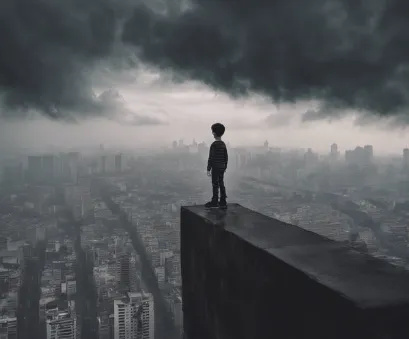
Childhood should be a time of joy, wonder, and exploration. Yet, for many children, the reality is far different. Hidden beneath a seemingly calm exterior, a silent storm may be brewing, manifesting as childhood depression. This pervasive mental health condition can significantly impact a child’s emotional, social, social, and academic development. As a child psychologist, I’ve witnessed firsthand the devastating consequences of undiagnosed and untreated childhood depression. In this article, we’ll delve into the complexities of this disorder, explore its symptoms, and discuss strategies for early identification and effective intervention.Guide to Recognizing Childhood Depression
The Hidden Depths of Childhood Depression: A Child Psychologist’s Perspective
Childhood depression, often referred to as major depressive disorder (MDD) in children, is a serious mental health condition that can affect children of all ages. Unlike transient mood swings or occasional sadness, childhood depression is characterized by persistent feelings of sadness, hopelessness, and worthlessness. its important to recognize that these symptoms can manifest differently in children compared to adults.
While adults may express their depression through feelings of guilt or regret, children may exhibit more behavioral symptoms, such as irritability, aggression, or social withdrawal. They may also experience changes in their appetite, sleep patterns, or energy levels. It’s crucial crucial to remember that these symptoms are not simply a phase or a normal part of growing up.
Unveiling the Silent Signs: Recognizing the Subtle Symptoms of Childhood Depression
As a child psychologist, I’ve learned that the key to early intervention lies in recognizing the subtle signs of childhood depression. WHile some children may present with obvious symptoms, others may mask their struggles with seemingly unrelated behaviors. Here are some common signs to watch for:
- Persistent sadness or irritability: A child who is persistently sad, moody, or irritable may be experiencing depression.
- Loss of interest in activities: A sudden decline in interest in hobbies, sports, or social activities can be a red flag.
- Changes in appetite or sleep patterns: Significant changes in eating habits, such as overeating or undereating, or disrupted sleep patterns can be indicative of depression.
- Fatigue and low energy: Persistent feelings of tiredness and lack of energy can be a symptom of depression.
- Difficulty concentrating: Children with depression may struggle to focus on schoolwork or other tasks.
- Social withdrawal: A decrease in social interactions and a preference for isolation can be a sign of depression.
- Changes in behavior: Increased irritability, aggression, or risk-taking behaviors may also signal underlying depression.
- Physical complaints: Some children may experience physical symptoms like headaches or stomachaches, which can be related to emotional distress.
If you notice these signs in your child, it’s important too seek professional help from a child psychologist or pediatrician. Early intervention can significantly improve a child’s outlook and prevent more serious consequences.
The Impact of Childhood Depression: A Child Psychologist’s Insights
Childhood depression can have a profound impact on a child’s overall well-being. It can interfere with they’re academic performance, social relationships, and self-esteem. Untreated depression can also increase the risk of substance abuse, risky behaviors, and even suicide.
Moreover, the effects of childhood depression can extend into adulthood. Children who experience depression are at a higher risk of developing depression and other mental health conditions later in life. By addressing childhood depression early on, we can help children develop the coping skills and resilience they need to thrive.
Seeking Expert Help: The Role of a Child Psychologist in Diagnosing and Treating Childhood Depression
If you suspect that your child may be struggling with depression, it’s essential to seek the expertise of a child psychologist. A child psychologist can conduct a comprehensive evaluation to determine if a diagnosis of depression is appropriate. This evaluation may involve interviews with the child and parents, as well as psychological testing.
Once a diagnosis is made, a child psychologist can develop an individualized treatment plan. Treatment options may include:
- Psychotherapy: Cognitive-behavioral therapy (CBT) is a common form of therapy that can help children identify and challenge negative thoughts and behaviors.
- Medication: In some cases, medication may be recommended in conjunction with therapy.
- Family therapy: Involving the entire family in therapy can help address family dynamics that may be contributing to the child’s depression.
Empowering Parents: A Child Psychologist’s Guide to Supporting Children Struggling with Depression
As a parent, yuo play a crucial role in your child’s mental health. Here are some tips for supporting a child who is struggling with depression:
- Open communication: Create a safe and supportive environment where your child feels comfortable sharing their feelings.
- Active listening: Pay attention to your child’s words and emotions, and validate their experiences.
- Limit screen time: Excessive screen time can exacerbate symptoms of depression.
- Encourage physical activity: Regular exercise can help boost mood and reduce symptoms of depression.
- Promote healthy eating habits: A nutritious diet can support overall well-being.
- Prioritize sleep: Adequate sleep is essential for mental health.
- Seek professional help: Don’t hesitate to consult with a child psychologist or other mental health professional.
Childhood depression is a serious condition that requires timely intervention. By understanding the signs, seeking expert help, and providing support, we can help children overcome this challenge and lead fulfilling lives. REmember, you are not alone. With the right support, children can recover from depression and build a brighter future.